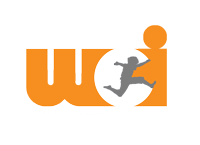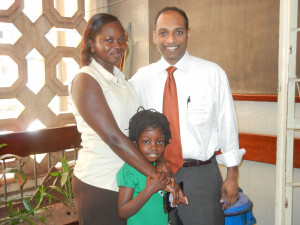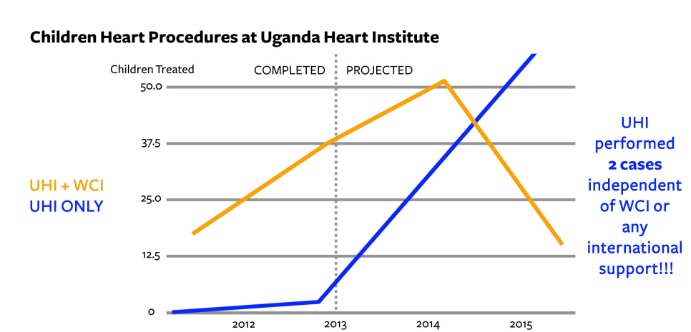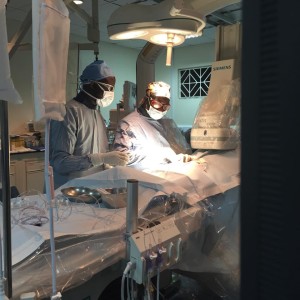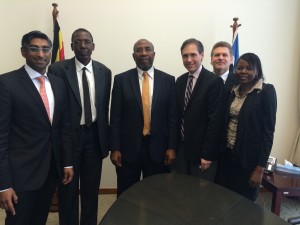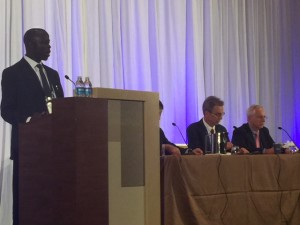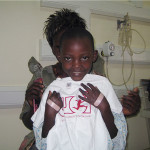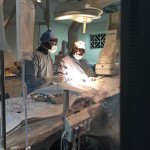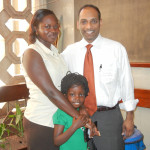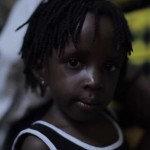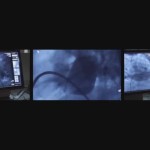In 2010, we initiated Project Heart by bringing Gift, a 5 year-old Ugandan girl, to Washington, D.C. to fix her heart. At that time there was no way of treating children like Gift anywhere in east Africa without risky surgical procedures. By performing pediatric cardiac catheterization, doctors in the U.S. (including WCI’s Dr. Kanishka Ratnayaka) were able to quickly and safely treat her, giving Gift the opportunity of to live a long, full, and active life.
As heartwarming as Gift’s story was, the problem was clear. Flying children to foreign countries was not only costly, it could also only benefit a handful of children out of the thousands in Uganda and east Africa with congenital heart defects. To address this problem, WCI set out an ambitious plan. We would help build and design a catheterization lab in Uganda, and then would train Ugandan doctors and medical personnel to perform this advanced procedure in their own country. That way, they could treat thousands of more children for generations to come.
To achieve that goal, WCI worked closely with our colleagues at the Uganda Heart Institute (UHI) at Mulago Hospital in Kampala, Uganda. By the end of 2011, as the catheterization lab at UHI neared completion, we challenged ourselves and our UHI colleagues with the goal of them performing 50 independent children’s catheterization cases by 2015, without the help of WCI or any foreign team.
WCI’s Project Heart Milestones Oct. 2010: WCI’s first Ugandan patient treated in the U.S. with cardiac catheterization Dec. 2011: UHI’s catheterization lab completed and equipment installed Feb. 2012: First 2 pediatric cardiac catheterization cases performed at UHI with WCI July 2013: First independent case performed by UHI Sept. 2014: 100th case performed at UHI Aug. 2015: 150th case performed at UHI Sept. 2015: 50th independent case performed at UHI (without WCI or other foreign assistance).
To meet that challenge, WCI conducted yearly clinical service trips to Uganda in 2012, 2013, 2014, and 2015 to train UHI staff – doctors, nurses, technicians – on these state-of-the-art techniques. In addition, to provide intensive and extended training, we sponsored fellowships and education sessions for doctors and technicians at prestigious children’s heart centers in India.
In 2015, our UHI colleagues exceeded our expectations. They performed over 50 cases this past year with no assistance from foreign medical teams. That number will only rise in coming years, as children in Uganda and other parts of east Africa now have the possibility of having their hearts fixed by local doctors in local facilities.
Our final major step with Project Heart was to ensure that the training, techniques, and facility we set up at UHI would be supported and funded for the foreseeable future. In 2015, we met with the Prime Minister of Uganda, who recognized the impact of our work, and pledged a three-fold increase in the budget for children’s heart care at UHI.
As we look to the future, WCI hopes to help UHI grow its children’s heart program. Our new goal is to support UHI physicians as they transition from trainees to teachers, educating others on the development of children’s heart programs and collaborating with WCI on vital research in international medical development.
